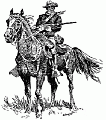I heard an interview with LTC Nathan Sassaman on NPR (you can hear the interview here: http://www.npr.org/templates/story/s...oryId=90950478 it is about 9 minutes in) about his new book. He seemed completely unapologetic and justified his decision to cover up the actions of his subordinates by saying that the environment was very stressful environment and he was forced to make very difficult decisions. He seems to also blame a zero defects culture in the Army. But his main defense in terms of the cover up of the bridge incident is that he did not believe that their actions were criminal and he believed it was his responsibility to protect his men.
All of these arguments seem like cop-outs to me. Yes, being a battalion commander in Iraq is a very stressful job, but if you do not want to be responsible for your actions in that environment, don't become a battalion commander. I'm sure LTC Sassaman knew going into the job that it would be stressful and he would be forced to make tough decisions and so this is not a defense. He is right in saying that it is unrealistic to expect no mistakes to be made. Tactical, technical, and strategic mistakes are an inevitable part of war, but moral mistakes are inexcusable. And covering up morally wrong actions is not part of protecting subordinates.
I am curious to hear other people's thoughts on the interview. I would also be very interested to hear from anyone who reads the book: http://www.amazon.com/Warrior-King-B...2342833&sr=8-1.









Bookmarks